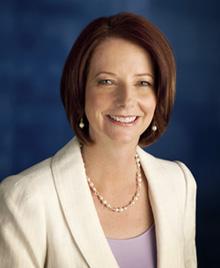Prime Minister Julia Gillard
 Australia's former leader Kevin Rudd won a Labor Party leadership vote over Prime Minister Julia Gillard, in a move that resulted in the country's first female leader quitting politics. Rudd won the support his fellow lawmakers 57 to 45 in a caucus vote 26 June 2013, meaning he woild lead the party into the September 2013 general elections in which it was expected to suffer heavy losses. Gillard challenged Rudd to the snap vote, promising to resign from politics if she lost.
Australia's former leader Kevin Rudd won a Labor Party leadership vote over Prime Minister Julia Gillard, in a move that resulted in the country's first female leader quitting politics. Rudd won the support his fellow lawmakers 57 to 45 in a caucus vote 26 June 2013, meaning he woild lead the party into the September 2013 general elections in which it was expected to suffer heavy losses. Gillard challenged Rudd to the snap vote, promising to resign from politics if she lost.
Julia Gillard was sworn in as the 27th Prime Minister of Australia on 24 June 2010 and re-sworn in as Prime Minister on 14 September 2010 following the 2010 Federal Election. Ms Gillard was born in Barry, Wales in 1961. She is the daughter of a nurse and aged care worker. Her family migrated to Australia in 1966 and she grew up in Adelaide. Ms Gillard became an Australian citizen in 1974 along with the rest of her family, and renounced her British citizenship before entering Parliament.
Ms Gillard was educated at Mitcham Demonstration School and Unley High School in South Australia. Julia Gillard started her Arts and Law degrees at the University of Adelaide. In 1983 she was elected national Education Vice-President of the Australian Union of Students (AUS) and moved to Melbourne to complete her degree at Melbourne University. Later that year, she was elected President of the AUS. After graduating Ms Gillard began work as a solicitor in Melbourne with the law firm Slater and Gordon and became a Partner in 1990. Ms Gillard's work at the firm focused on employment law where she worked on securing fairer treatment for workers and fought for clothing trades outworkers who had been underpaid.
From 1996 to 1998 Ms Gillard served as Chief-of-Staff to the then Opposition Leader of the State of Victoria, John Brumby. Julia Gillard first contested the Federal seat of Lalor for the Australian Labor Party in 1998 and was elected that year. From 1998 to 2001 Ms Gillard served on the House of Representatives Standing Committee on Employment, Education and Workplace Relations. In 2001 Ms Gillard was appointed Shadow Minister for Population and Immigration and subsequently took on responsibilities for Reconciliation and Indigenous Affairs in 2003.
From 2003 to 2006 Ms Gillard served as Shadow Minister for Health. On 4 December 2006 Ms Gillard was appointed Deputy Leader of the Australian Labor Party and served as Shadow Minister for Employment and Industrial Relations and Social Inclusion. Following the Australian Labor Party's victory at the 2007 Federal Election, Ms Gillard was sworn in as Deputy Prime Minister and Minister for Education, Employment and Workplace Relations and Social Inclusion.
Julia Gillard first assumed the office of Prime Minister in June 2010 after Kevin Rudd lost the confidence of the Australian Labor Party because of declining poll numbers and a sense of poor implementation of government programs. Gillard called for an early election after only a month as Prime Minister.
The August 21, 2010, federal election resulted in a hung parliament, with neither the Labor Party, under the leadership of Gillard, nor the Liberal/National Coalition, led by Opposition Leader Tony Abbott, holding enough seats to form a government. The resurgent Coalition gained 8 seats from where it stood after the 2007 election, while the Labor Party lost 11 seats. After the election the Labor Party was able to secure the support of the Greens Party Member of Parliament (MP) and three independent MPs to gain a majority of 76 seats. The composition of the new Senate, to be seated in July 2011, is 34 seats for the coalition, 31 for the ALP, nine for the Greens, one for the Democratic Labor Party, and one independent. By gaining four seats the Greens now hold key swing votes and greater influence in the Senate.
Gillard was expected to pursue her campaign promises to build a national broadband network and make progress in addressing climate change. The Australian Government's foreign policy shows strong continuity with that of its predecessors. Gillard has consistently stressed the importance of Australia's relations with the U.S. and U.S. engagement in the Asia-Pacific region. Her government was committed to Australia's role in Afghanistan, where it had about 1,550 troops.
Julia Gillard lives at The Lodge in Canberra with her partner, Tim Mathieson.
|
NEWSLETTER
|
| Join the GlobalSecurity.org mailing list |
|
|
|

